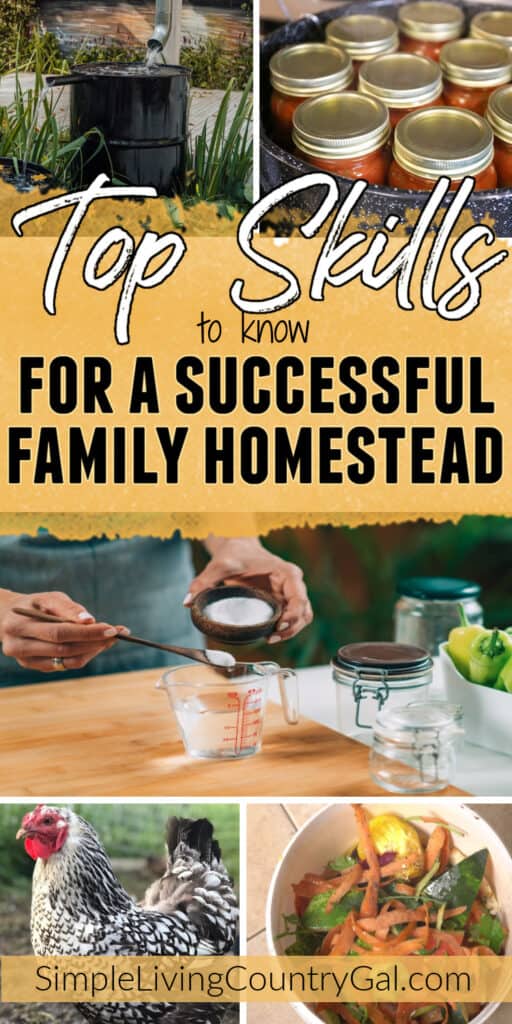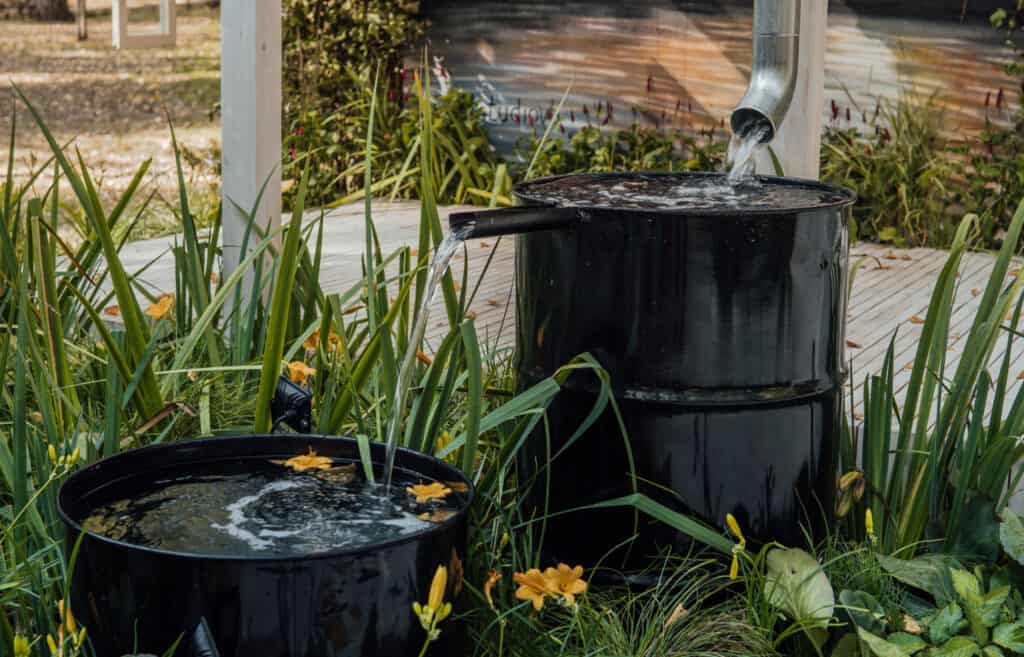homesteading skills list
If you are thinking about starting a homestead, you may be curious about what you need to know first. To help, we have a homesteading skills list of basic things you may want to have an idea about before you dive in. Skills that cover a few different areas so you can feel more confident from day one.
Homesteading tips are good, but learning skills to better prepare for this lifestyle is even better.

When we first began homesteading, I always felt I was behind where I needed to be. The biggest reason was that I dove in with little prep. A city girl with no idea of how to be self-sufficient other than making bread and growing a few tomatoes. If I can share one tip it would be this, prepare before you begin.
This article was written with that tip in mind by putting together a homesteading skills list that covers essential skills in different areas. From growing your own food to taking care of animals and maintaining your home, this list touches on each of the main areas. By learning these skills, you can feel more confident and well-equipped to start your homesteading journey.
What are the main areas of a homestead?
There are a few main areas to consider when starting a homestead, and each one requires different skills. These areas include:
- Gardening – Growing fruit, produce, and herbs that you and your family routinely eat.
- Food Preservation – Canning, drying, and freezing as much food as you can to last throughout the winter months.
- Livestock – Raising animals for meat, eggs, milk, and other dairy products.
- Sustainable Living – Making your own household items such as soap, cleaning products, and beauty products to reduce waste and save money.
- Homestead Maintenance – Learning basic plumbing, carpentry, and mechanical skills to maintain and repair your home and equipment.
- Emergency Preparedness – Knowing how to handle medical emergencies, natural disasters, and other unexpected situations that may arise on a homestead.
- Energy efficiency – Finding ways to reduce energy consumption and utilize alternative energy sources such as solar or wind power.
You can create a well-rounded and self-sufficient homestead by learning the necessary skills in each of these areas.
Homesteading Skills List
This list is meant to help prepare you and not overwhelm you. Read through the list, writing down the different areas you want to dive into more deeply. You can check out books at the library that focus on each area you have on your list or purchase books online and begin setting up a homestead library in your home.
Heaven’s Harvest Survival Seed Bank Kit (Over 25,000) Fruit & Vegetable Non-GMO Heirloom Seeds for Planting a 3+ Acre Home Garden. 100% Secure: Emergency Weather-Proof Bucket (1-Pack)


Gardening
One of the most important skills for a homesteader is gardening. Growing your own food not only provides you with fresh and healthy produce, but it also allows you to be self-sufficient and reduce your grocery bill. Some essential gardening skills to learn include:
- Seed Starting – Knowing how to start plants from seed is essential for a successful garden. This skill allows you to have control over the varieties of plants you grow and saves money compared to buying already started plants.
- Crop Rotation – Rotating your crops each year helps prevent soil depletion and pest problems. Learn about companion planting and which plants thrive together.
- Composting – Creating your own compost is a great way to reduce waste and provide nutrient-rich soil for your garden.
- Pest Control – Learning how to control pests without the use of harmful chemicals is important for both your health and the environment.
Gardening Resources:
Food Preservation
Once you have a successful garden, the next step is learning how to preserve your harvest for year-round consumption. Some essential food preservation skills include:
- Canning – This method involves packing food into jars and heating them to kill bacteria and seal the jars.
- Dehydrating – Dehydrating food removes moisture, making it last longer without spoiling. This method is great for preserving fruits, vegetables, and herbs.
- Freezing – Freezing food is a quick and easy way to preserve it. It’s important to properly package and label your frozen foods.
- Fermentation – Fermenting foods not only preserves them but also adds beneficial probiotics to your diet. Popular fermented foods include sauerkraut, kimchi, and kombucha.
By learning these essential gardening and food preservation skills, you can reduce your reliance on store-bought produce and have a sustainable source of fresh, healthy food. Not only will it save you money in the long run, but it also allows for a deeper connection to your food and where it comes from.
Food Preservation:
Livestock and Poultry
For those interested in taking their self-sufficiency journey a step further, raising livestock and poultry can provide a variety of benefits. Some options for home-raised animals include:
- Chickens – Chickens are relatively easy to care for and provide a constant supply of fresh eggs. They also make great additions to compost piles.
- Goats – Goats are excellent for clearing land and providing milk, meat, and fiber.
- Bees – Keeping bees not only produces honey but also helps pollinate your garden. It’s important to research local laws and regulations before setting up a beehive.
- Rabbits – Rabbits are a low-maintenance option for those looking to raise protein-rich meat.
- Quail – Quail are small, easy-to-care-for birds that can provide tasty eggs and meat.
- Pigs – Pigs are a larger and more challenging option for those looking to raise meat. They require more space and attention but can also provide a variety of products such as pork, lard, and sausages.
- Sheep – Sheep are great for grazing and providing wool, meat, and milk. They do require more space than some other options.
- Cows – Cows are a major commitment in terms of space, resources, and care. However, they can provide a sustainable source of dairy products and meat.
When it comes to raising livestock and poultry, it’s important to consider the resources and space available, as well as local regulations and laws. It’s also essential to research proper care and handling techniques for each type of animal.
More on Livestock:
Sustainable Living
Sustainable living is making more of what you need at home, relying less on items you would normally purchase at a store.
- Cleaning supplies – You can make your own cleaning supplies with natural ingredients, such as vinegar and baking soda. This not only reduces waste but also eliminates the use of harsh chemicals in your home.
- Soap – You can also make your own soap using natural ingredients, reducing the use of plastic packaging and chemicals found in store-bought options.
- Entertainment – Check out books or movies at the library rather than purchasing them.
- Convenience food – Make mixes and store them in your pantry; use them for baking desserts, pancakes, breads, and dressings. This not only saves you money but also reduces packaging and preservatives in your food.
In addition to making your own products, sustainable living also involves reducing waste and conserving resources.
DIY Home Supplies:
Homestead Maintenance
Learning basic skills will help you more confidently make repairs or updates to your home, equipment, and outbuildings without having to call in expensive repair services.
- Carpentry – Learn basic carpentry skills to make repairs, build furniture or even construct small outbuildings on your property.
- Plumbing – Knowing how to fix leaky faucets and unclog drains can save you money on plumbing services.
- Mechanical – Basic mechanical skills, such as changing oil and checking fluids in your vehicle or tractor, can save you from costly repairs.
Emergency Preparedness
Being self-sufficient means being prepared for emergencies. In addition to having a well-stocked first-aid kit, there are other measures you can take to ensure the safety of your family and property.
- Food storage – Keep a supply of non-perishable foods stored in a cool, dry place in case of power outages or natural disasters.
- Water storage – Store at least one gallon of water per person per day for emergency use.
- Generator – Consider investing in a generator to provide electricity during power outages.
- First aid and medical supplies – Keep a well-stocked first-aid kit and necessary prescription medications on hand.
- Emergency plan – Create an emergency plan with your family and practice it regularly.
- Emergency contacts – Keep a list of emergency contacts, including family, friends, and local authorities.
- Fire safety – Install smoke detectors and fire extinguishers in your home, and have a designated meeting place in case of a fire.

Energy efficiency
Becoming self-sufficient also means being conscious of your energy usage and finding ways to reduce it. Not only will this save you money, but it is also better for the environment.
- Alternative energy sources – Consider installing solar panels or a wind turbine to generate your own electricity.
- Energy efficient appliances – Replace old, inefficient appliances with newer, energy-efficient models.
- Insulation – Ensure your home is properly insulated to reduce heating and cooling costs.
- Natural lighting – Use natural light whenever possible instead of relying on artificial lighting.
- Water conservation – Install low-flow fixtures and fix any leaks to reduce water usage.
Becoming self-sufficient has numerous benefits, including saving money, reducing reliance on external resources, and being better prepared for emergencies. By taking steps such as learning practical skills both inside and outside of the home, you can become more self-sufficient and ultimately lead a more sustainable lifestyle.
Remember, becoming self-sufficient is a journey and may take time, but the rewards are well worth it in the end. Start small, set achievable goals, and continue to expand your self-sufficiency as you go along.




